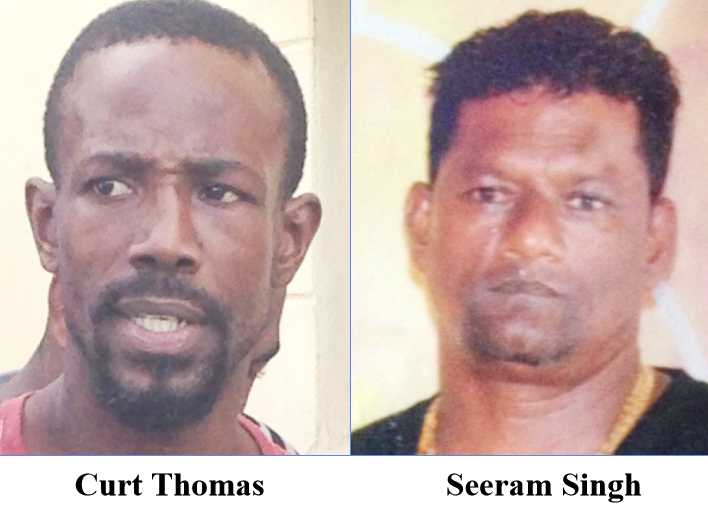Curt Thomas was yesterday afternoon found guilty of the murder of Parika fuel dealer Seeram Singh but his sentencing has been deferred to facilitate the presentation of a probation report which his attorney requested.
When the verdict was announced, a visibly irate Thomas who attended his trial virtually from the Lusignan Prison immediately began proclaiming his innocence.
He got up from his chair, angrily took off his head phones and exclaimed “I din come hay fuh dis. I come fuh build a house. Y’all telling me I kill somebody I don’t even know,” as prison officers tried to restrain him.
The officers handcuffed him and Justice Navindra Singh ordered them to mute the microphone as Thomas’ expletive-laced rants became so loud that he was disturbing the proceedings.
His lawyer Lyndon Amsterdam said that he did not have prior opportunity to consult with his client about requesting a probation report and given Thomas’ behaviour after learning his fate, both Amsterdam and the judge agreed that it was not the best time to so ascertain.
In the circumstances, Justice Singh said he would give Amsterdam up until Monday to have discussions with his client and a date will thereafter be set for sentencing.
In a plea of mitigation, however, counsel begged the judge to extend mercy at the time of sentencing and to impose a sentence which would allow him to return to society and make positive contributions, expressing the hope that he would use his incarceration as a time of reflection.
He said that Thomas, 44, had no previous brushes with the law and that his remonstrations may only have been his way of exhibiting his disappointment with the verdict.
The lawyer asked that this not be used against his client in sentencing even as he said that the jury had spoken and its verdict would therefore have to be respected.
“Me ain’t respect duh,” Thomas had, however, interjected before his microphone had been muted.
Amsterdam noted that murder is a heinous crime but asked the judge to consider that while a life has been lost, sentencing should not only be punitive but rehabilitative even as he expressed the hope that during that time Thomas would be able take responsibility for his actions given the verdict rendered by the jury.
Singh was shot dead and robbed on the night of Saturday April 30th, 2016, at Parika Outfall, East Bank Essequibo.
In an unsworn statement on Tuesday, Thomas, also known as `Deportee’ and `Yankee’, said he was never at or near the scene of the murder and that he did not know Singh.
According to him, his girlfriend and one of the primary investigators, whom he identified as “Officer Bowman,” once shared a relationship and he believed that to be the reason he was charged with the crime.
It was the state’s case that Thomas had shot, killed and robbed Singh.
Prosecutor Tuanna Hardy had asked the jury to rely on the testimony of her witnesses which she said substantiated the charge against the now-convict.
Eyewitness Rajmohan Autar had told the court that he saw Thomas shoot and rob Singh of his gold chain on the night in question. He subsequently pointed him out in an identification (ID) parade.
But defence attorney Lyndon Amsterdam in his address to the jury sought to discredit Autar’s testimony, pointing out that “many variations” were given by the witness’s account which were uncovered under cross-examination.
Against this background, he had asked the jury not to rely on Autar’s evidence.
The defence was contending that Autar, who had admitted to being mistaken in identifying persons before, was also on this occasion mistaken—which Autar admitted under cross- examination was possible.
Meanwhile, Amsterdam said that the ID parade on which his client was placed was not only unfairly conducted but was conducted in breach of standard police operating procedures.
The police witness who had conducted the parade had agreed with Amsterdam under cross-examination that it featured several breaches, but nonetheless maintained that it was fair since Thomas had been “positively” identified by Autar.
Also advanced by Hardy to bolster the state’s case, was the testimony of police witnesses who said that clothes which Thomas had provided to them which he wore on the night in question tested positive for gunshot residue (GSR).
Amsterdam asked the jury not to rely on this either, advancing that—assuming but not admitting that GSR was found on the items and the hand of the accused as claimed by the state, it possibly could have been through transfer/cross-contamination from a person or a surface where the items were kept at the police station.
Testifying on behalf of Thomas—Dorothy Pratt, his girlfriend’s mother, had told the court that Thomas was at her house on the night in question at 9pm.
Under cross-examination by Hardy, however, the woman admitted that she would be unable to account for Thomas’ whereabouts any time before or even after that time.
Singh was said to have been killed sometime earlier on the night in question.






